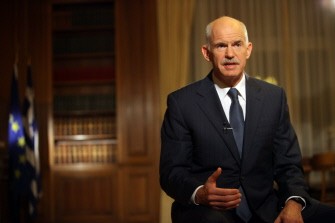LONDON, Oct 28, 2011 (AFP) - The deal reached at the eurozone leaders' summit is merely a "sticking plaster" solution which leaves Prime Minister David Cameron facing "significant" problems, Britain's press said Friday.
British newspapers, which usually tend towards a eurosceptic position, argued that closer fiscal union between eurozone nations was a recipe for disaster.
And some also questioned whether Cameron was serious about clawing back powers from Brussels should that occur.
"Another emergency summit, another posturing display of egos and another round of haggling over what would seem to be yet another sticking-plaster solution," the eurosceptic Daily Mail said.
The popular centre-right paper said German Chancellor Angela Merkel's pre-summit comments that peace in Europe "should not be taken for granted" were "irresponsible, scaremongering warnings of war".
"When will the eurofanatics look reality in the face?" the paper's editorial asked.
"When will they accept that crises like this one will recur for as long as the eurozone retains 17 separate economic policies but only one currency".

The Times' editorial, headlined "Future Disharmony", said the deal heralded "a great shift in power, delivered in the unpoetic prose of Euro-jargon."
The bloc's "timid leaders" had stumbled into the deal, which could "last a little while but not for long," it predicted.
Even the centre-left Guardian, the country's most euro-friendly newspaper, expressed doubts about the deal.
"The continent's leaders emerged bleary-eyed into yesterday's grey Brussels dawn not with straightforward orders to institutions which actually exist, but with baffling plans to magic money out of somewhere," it said.
"It is to be very much hoped that their fiendishly complex plan can be delivered, since the alternative is certain depression."
Britain's eurosceptic commentators believe that eurozone leaders will insist on closer fiscal union in the future to prevent a widening of the regional disparities which contributed to the debt crisis.
They fear that would mean a diminished role for Britain in EU policy-making and so they they claim Cameron has the right to push for powers to be brought back under the control of national government.
"Cameron has some enormously significant choices to make," the rightwing Daily Telegraph noted in its editorial. "Which powers does he believe should be repatriated? What is his strategy for that?"
























